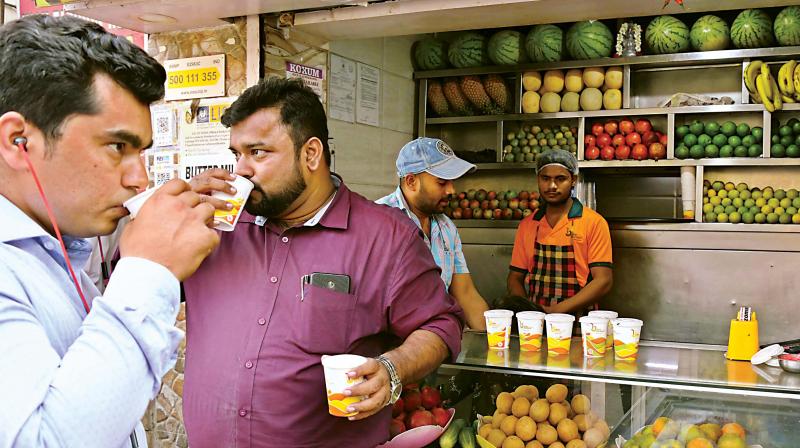Get high on water, it’s steaming at 35°C!
The temperature has been on a consistent departure of 2-3 degrees in the past few days.

Bengaluru is reeling under a heat wave, with the maximum temperature hovering at a sweltering 35 degrees Celsius. The forecast isn’t too good either, with the Met Department predicting an increase to around 37 degrees Celsius and no rain on the horizon, for those who hope the April showers will improve the situation. And while a chilled, aerated beverage hits the spot on a hot day, doctors advise against it. While the consumption of sugar-sweetened drinks increases, so does the risk of heart disease, reports Abilash Mariswamy
On Monday, the city burned as temperatures rose to 35.5 degrees Celsius. Bengalureans, unaccustomed to such heat in the Garden City, are awaiting the summer showers, as are people across the state as Karnataka reels under a heat wave. However, experts from the Indian Meteorological Department say things are only going to worsen over the next few days and that Bengaluru must brace for a maximum temperature of around 37 degrees Celsius, with no rain expected presently.
Doctors say that the excessive rise in temperatures is likely to affect people's health in many forms especially with a larger number of sunstroke cases.
“The high temperature witnessed by the city seems to be taking a toll on our health. Apart from an increase in the number of patients suffering from conditions like influenza and bronchitis, dehydration, backache, and extreme fatigue, sunstrokes are also becoming common,” said Dr. Mahesh Kumar, Consultant Internal Medicine, Narayana Health City.
With the temperature hovering at record highs many people in the city are finding it difficult to cope with the surge in mercury levels, and stepping out in the afternoons is no longer a consideration.
Sunith, a resident of Dasarahalli said, “I have been living in Bengaluru from past 10 years and this is the first time I am experiencing such a high temperature. I often experience fatigue, uneasiness, and allergic cold these days when I am at work.”
According to the Indian Meteorological Department, Bengaluru’s director and in-charge C.S. Patil, said, “The temperature has been on a consistent departure of 2-3 degrees in the past few days. This might increase to additional 3-4 degrees in the coming days across the city, while the northern part of the state will be experiencing more heat compared to previous years.”
Kerala, meanwhile, has issued a high alert, after three suspected sunstroke deaths. However, reports say there are several hundreds of sunstroke cases in the state since the beginning of March.
Recommending some preventive measures, Dr. Mahesh said, “While some of the conditions are unavoidable, a majority of health issues during summer can be tackled by drinking 2.5 to 3 litres of water every day to improve muscle hydration and prevent muscle aches, one should also avoid packaged food and drinks, wear loose and light-colored clothes, avoid stepping out between 11 am and 3 pm as during that time the sunrays hit us directly. Wearing caps and sunglasses can also be very beneficial.”
The Bitter truth behind that sweet tooth
Having to take a walk down the street is an exhausting affair with temperatures at record highs. Nothing is more tempting than reaching for an iced beverage, most of which are artificially sweetened. Health experts, however, warn against this, saying that while they might be momentarily satisfying, it is not good for the body in the long run. Sweetened drinks are especially risky because they can raise the risk of heart disease.
Dr. Mahesh said that the increased consumption of sweetened packaged drinks to quench the thirst caused by the extreme weather also seems to be adversely affecting our health. “Packaged drinks contain a lot of sugar, preservatives and artificial chemicals. Consuming those increases the sugar level and also urine output, aggravating the dehydration experienced by the body. High-calorie consumption can increase the risk of cardiovascular diseases in the long term,” he added.
According to the journal of the American Heart Association, Circulation released findings that show people who drink sugar-sweetened beverages have an increased risk for cardiovascular disease and some cancers.
Dr. Girish Navasundi, Consultant Cardiologist, Apollo Hospitals Bannerghatta Road also said, “Sugar-sweetened beverages (SSBs), or soft drinks, include carbonated and noncarbonated beverages that contain sugar-based caloric sweeteners and are flavored with fruit juice or natural or artificial flavors. Most epidemiological studies strongly show that frequent intake of these beverages contributes to the onset of metabolic syndrome, diabetes, heart attack, and stroke. It is not so much about what you eat but rather about how much of it you consume. Sugar is like cocaine. You get addicted.”
He also said in addition, higher consumption of SSBs is linked to an increased risk of developing type 2 diabetes- obesity and type 2 diabetes are important risk factors for coronary heart disease (CHD). “Soda may be used to help frequent consumers of sugary drinks cut back their consumption, but water is the best and healthiest choice,” said Dr. Girish.

